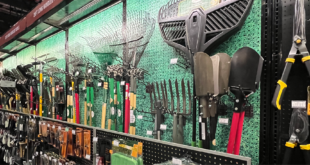 Accurately assessing the value of a business is challenging but important for preparing a store to sell and setting a realistic asking price.
Accurately assessing the value of a business is challenging but important for preparing a store to sell and setting a realistic asking price.
Hardware Retailing spoke with Gary Pittsford, president and CEO of Castle Wealth Advisors in Indianapolis, to get advice for store owners who are planning to sell their businesses. Pittsford works with retailers from across the U.S. to prepare their businesses for ownership transitions.
Hardware Retailing: How should the average independent home improvement retailer go about setting an asking price for a business?
Gary Pittsford: When it comes to valuing a retail hardware business, one has to look at all of the assets. I would be selling all of my inventory, furniture, fixtures, shelving, signage. Most of the assets on the balance sheet.
Now you would keep patronage stock within the co-op, and you would keep most of your cash. So, if somebody’s got $100,000 in cash, you would probably take $95,000.
If you’ve got accounts that are bad, then you want to take that off. Make sure the inventory is up to date and current.
There are other things that would adjust the value. Let’s say I had a company that had great employees. The buyer wants great employees, so that might help hold up the price. If I’ve got bad employees or if I have employees who might retire in a year or so, then that would affect the value. There’s a lot involved in pricing a business.
HR: What is most challenging about a business valuation process?
GP: No. 1, a lot of business owners don’t have accurate accounting, so trying to find the real information is a challenge. Making sure that the data we’re getting is accurate is challenging. If you give me good information, then we’ve got a more accurate value. The challenge is making sure that we’ve got all good information.
I can look at the last two or three tax returns and financial statements to see if they line up. If they don’t line up, then I know something isn’t right.
HR: What advice do you offer retailers who are planning to sell their businesses within the next two to five years?
GP: Develop a plan. I talk about a three-year plan. If you’re going to sell within the next three to five years, if you can, increase your gross margins 1 percent each year. If at all possible, increase your gross margins a little bit the last three years.
And, also, try to reduce your expenses by 2 percent each year. Maybe you reduce the payroll. Maybe you reduce maintenance on the trucks or on postage. Two percent is not a lot of money, but you’re providing a huge amount of cash flow to the bottom line.
Clean up your financial statements. If I’m going to buy that company, I’m going to ask for the past two to three years of financials and tax returns. I’m going to ask, why did the company loan you money? Why did you loan money to the company? If you clean up your balance sheets, then there are fewer items for the buyer to ask questions about.
Clean up the building. Make it look pretty. Make sure the floors are polished. Make sure everything’s dusted.
For most hardware store owners, the bulk of their net worth is in that company. That business is their pension plan. In order to get the best pension plan, you’ve got to get that gross margin up to a higher number.
HR: What is your advice to retailers planning to sell within the next 10 years or later?
GP: Get your gross margins up. Keep them up as high as you can. Keep expenses down as much as you can. Stay within the industry averages on payroll and rent, based on the NHPA Cost of Doing Business Study, and make sure they’re as good or better than average.
If you’re 10 years out from selling or transitioning it to your kids or someone else, you can’t let the rent get too high or the payroll get too high. You’ve got to stay within national averages.
We have a lot of people in the hardware industry who are over the age of 60, and they all want to retire in the next couple years, but they need to do everything we talked about to get their businesses ready to sell. You want to make it look good, make it profitable and have great employees.
 Hardware Retailing The Industry's Source for Insights and Information
Hardware Retailing The Industry's Source for Insights and Information








